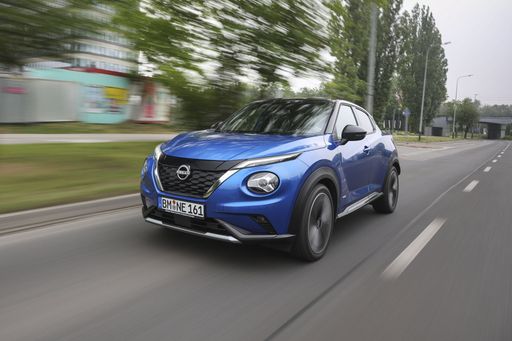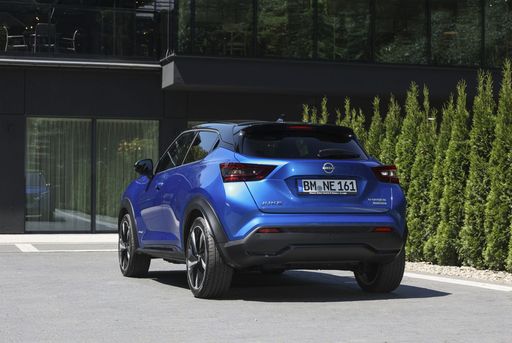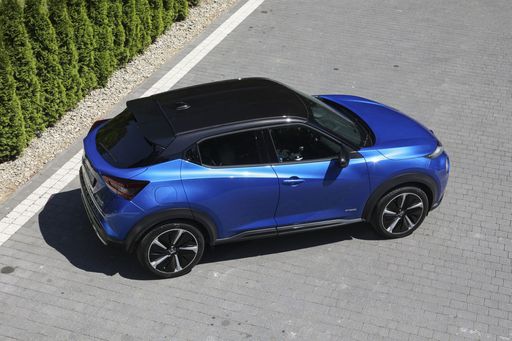Nissan Juke vs Peugeot 208 - Differences and prices compared
Compare performance (143 HP vs 156 HP), boot space and price (21400 £ vs 20700 £ ) at a glance. Find out which car is the better choice for you – Nissan Juke or Peugeot 208?
Costs and Efficiency:
When it comes to price and running costs, the biggest differences usually appear. This is often where you see which car fits your budget better in the long run.
Peugeot 208 has a slight advantage in terms of price – it starts at 20700 £ , while the Nissan Juke costs 21400 £ . That’s a price difference of around 703 £.
Fuel consumption also shows a difference: Peugeot 208 manages with 4.50 L and is therefore slight more efficient than the Nissan Juke with 4.70 L. The difference is about 0.20 L per 100 km.
Engine and Performance:
Power, torque and acceleration say a lot about how a car feels on the road. This is where you see which model delivers more driving dynamics.
When it comes to engine power, the Peugeot 208 has a minimal edge – offering 156 HP compared to 143 HP. That’s roughly 13 HP more horsepower.
In acceleration from 0 to 100 km/h, the Peugeot 208 is noticeable quicker – completing the sprint in 8.30 s, while the Nissan Juke takes 10.10 s. That’s about 1.80 s faster.
In terms of top speed, the Peugeot 208 performs minimal better – reaching 200 km/h, while the Nissan Juke tops out at 180 km/h. The difference is around 20 km/h.
There’s also a difference in torque: Peugeot 208 pulls distinct stronger with 270 Nm compared to 200 Nm. That’s about 70 Nm difference.
Space and Everyday Use:
Whether family car or daily driver – which one offers more room, flexibility and comfort?
Both vehicles offer seating for 5 people.
In curb weight, Peugeot 208 is minimal lighter – 1165 kg compared to 1274 kg. The difference is around 109 kg.
In terms of boot space, the Nissan Juke offers a bit more room – 422 L compared to 352 L. That’s a difference of about 70 L.
In maximum load capacity, the Nissan Juke performs to a small extent better – up to 1305 L, which is about 142 L more than the Peugeot 208.
When it comes to payload, Peugeot 208 minimal takes the win – 430 kg compared to 427 kg. That’s a difference of about 3 kg.
Who wins the race in the data check?
The Peugeot 208 sits well ahead of its rival in the objective data comparison.
This result only shows which model scores more points on paper – not which of the two cars feels right for you.
Costs and Consumption
View detailed analysis
Engine and Performance
View detailed analysis
Dimensions and Body
View detailed analysis

Peugeot 208
Nissan Juke
The Nissan Juke is a pocket-sized crossover that refuses to blend in, with quirky styling and a cheeky stance that turns heads at every traffic light. It’s ideal for shoppers who value personality and nimble urban driving over maximum practicality, delivering surprising pep and a well-equipped feel for everyday fun.
details



Peugeot 208
The Peugeot 208 feels like a city-savvy fox: compact, stylish and surprisingly grown-up, with a cabin that punches above its weight and enough personality to make daily commutes a little less boring. It’s a smart pick for buyers who want chic practicality without the showroom bluster — easy to park, thrifty to run and oddly fun when the road tightens up.
details



Costs and Consumption |
|
|---|---|
|
Price
21400 - 30100 £
|
Price
20700 - 35200 £
|
|
Consumption L/100km
4.7 - 6 L
|
Consumption L/100km
4.5 - 5.2 L
|
|
Consumption kWh/100km
-
|
Consumption kWh/100km
14.1 - 15.4 kWh
|
|
Electric Range
-
|
Electric Range
362 - 432 km
|
|
Battery Capacity
0.60 kWh
|
Battery Capacity
46 - 51 kWh
|
|
co2
107 - 136 g/km
|
co2
0 - 117 g/km
|
|
Fuel tank capacity
46 L
|
Fuel tank capacity
44 L
|
Dimensions and Body |
|
|---|---|
|
Body Type
SUV
|
Body Type
Hatchback
|
|
Seats
5
|
Seats
5
|
|
Doors
5
|
Doors
5
|
|
Curb weight
1274 - 1405 kg
|
Curb weight
1165 - 1530 kg
|
|
Trunk capacity
354 - 422 L
|
Trunk capacity
309 - 352 L
|
|
Length
4210 mm
|
Length
4055 mm
|
|
Width
1800 mm
|
Width
1745 mm
|
|
Height
1593 mm
|
Height
1430 mm
|
|
Max trunk capacity
1237 - 1305 L
|
Max trunk capacity
1118 - 1163 L
|
|
Payload
405 - 427 kg
|
Payload
380 - 430 kg
|
Engine and Performance |
|
|---|---|
|
Engine Type
Petrol, Full Hybrid
|
Engine Type
Petrol, Electric, Petrol MHEV
|
|
Transmission
Manuel, Automatic
|
Transmission
Manuel, Automatic
|
|
Transmission Detail
Manual Gearbox, Dual-Clutch Automatic, Automatic Gearbox
|
Transmission Detail
Manual Gearbox, Reduction Gearbox, Dual-Clutch Automatic
|
|
Drive Type
Front-Wheel Drive
|
Drive Type
Front-Wheel Drive
|
|
Power HP
114 - 143 HP
|
Power HP
101 - 156 HP
|
|
Acceleration 0-100km/h
10.1 - 11.8 s
|
Acceleration 0-100km/h
8.3 - 10.9 s
|
|
Max Speed
166 - 180 km/h
|
Max Speed
150 - 200 km/h
|
|
Torque
200 Nm
|
Torque
205 - 270 Nm
|
|
Number of Cylinders
3 - 4
|
Number of Cylinders
3
|
|
Power kW
84 - 105 kW
|
Power kW
74 - 115 kW
|
|
Engine capacity
999 - 1598 cm3
|
Engine capacity
1199 cm3
|
General |
|
|---|---|
|
Model Year
2024
|
Model Year
2023 - 2025
|
|
CO2 Efficiency Class
D, E, C
|
CO2 Efficiency Class
D, A, C
|
|
Brand
Nissan
|
Brand
Peugeot
|
What drive types are available for the Nissan Juke?
Available configurations include Front-Wheel Drive.




